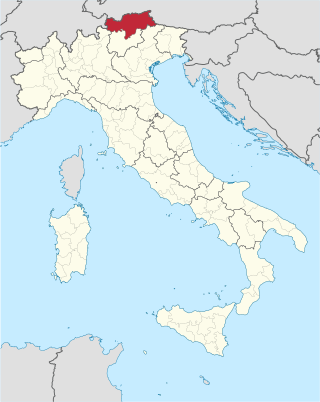
South Tyrol is an autonomous province in northern Italy. An English translation of the official German and Italian names could be the Autonomous Province of Bolzano – South Tyrol, reflecting the multilingualism and different naming conventions in the area. Together with Trentino, South Tyrol forms the autonomous region of Trentino-Alto Adige/Südtirol. The province is the northernmost of Italy, the second largest with an area of 7,400 square kilometres (2,857 sq mi), and has a total population of about 534,000 inhabitants as of 2021. Its capital and largest city is Bolzano.

Trentino-Alto Adige/Südtirol is an autonomous region of Italy, located in the northern part of the country. The region has a population of 1.1 million, of whom 62% speak Italian as their mother tongue, 30% speak South Tyrolean German and several foreign languages are spoken by immigrant communities. Since the 1970s, most legislative and administrative powers have been transferred to the two self-governing provinces that make up the region: the province of Trento, commonly known as Trentino, and the province of Bolzano, commonly known as South Tyrol. In South Tyrol, German remains the sizeable majority language.

The South Tyrolean People's Party is a regionalist and mostly Christian-democratic political party in South Tyrol, an autonomous province with a German-speaking majority in northern Italy. Dieter Steger has been party leader since 2024, while party member Arno Kompatscher has been governor of South Tyrol since 2014.

The Julian March, also called Julian Venetia, is an area of southern Central Europe which is currently divided among Croatia, Italy, and Slovenia. The term was coined in 1863 by the Italian linguist Graziadio Isaia Ascoli, a native of the area, to demonstrate that the Austrian Littoral, Veneto, Friuli, and Trentino shared a common Italian linguistic identity. Ascoli emphasized the Augustan partition of Roman Italy at the beginning of the Empire, when Venetia et Histria was Regio X.

The Citizens' Union for South Tyrol, formerly Union for South Tyrol, was a national-conservative and, at times, right-wing populist political party active in South Tyrol, Italy.

The South Tyrol Option Agreement was an agreement in effect between 1939 and 1943, when the native German and Ladin-speaking people in South Tyrol and several other municipalities of northern Italy, which had belonged to Austria before WWI, were given the option of either emigrating to neighboring Nazi Germany or remaining in Fascist Italy, where the German minority was subjected to repressive Italianization efforts.
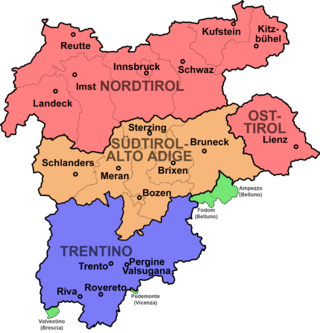
Modern-day South Tyrol, an autonomous Italian province created in 1948, was part of the Austro-Hungarian County of Tyrol until 1918. It was annexed by Italy following the defeat of the Central Powers in World War I. It has been part of a cross-border joint entity, the Euroregion Tyrol-South Tyrol-Trentino, since 2001.

The First Austrian Republic, officially the Republic of Austria, was created after the signing of the Treaty of Saint-Germain-en-Laye on 10 September 1919—the settlement after the end of World War I which ended the Habsburg rump state of Republic of German-Austria—and ended with the establishment of the Austrofascist Federal State of Austria based upon a dictatorship of Engelbert Dollfuss and the Fatherland's Front in 1934. The Republic's constitution was enacted on 1 October 1920 and amended on 7 December 1929. The republican period was increasingly marked by violent strife between those with left-wing and right-wing views, leading to the July Revolt of 1927 and the Austrian Civil War of 1934.

General elections were held in Italy on Sunday 2 and also on Monday 3 June 1946. They were the first after World War II and elected 556 deputies to the Constituent Assembly. Theoretically, a total of 573 deputies were to be elected, but the election did not take place in the Julian March and in South Tyrol, which were under military occupation by the United Nations.
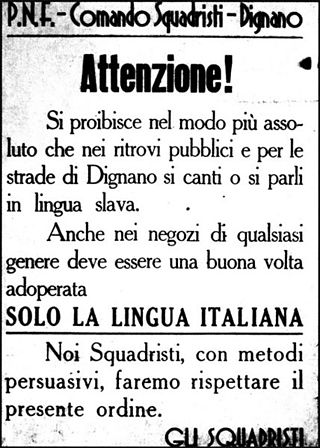
Italianization is the spread of Italian culture, language and identity by way of integration or assimilation. It is also known for a process organized by the Kingdom of Italy to force cultural and ethnic assimilation of the native populations living, primarily, in the former Austro-Hungarian territories that were transferred to Italy after World War I in exchange for Italy having joined the Triple Entente in 1915; this process was mainly conducted during the period of Fascist rule between 1922 and 1943.

Lega Alto Adige Südtirol, whose official name is Lega Alto Adige Südtirol per Salvini Premier, is a regionalist political party active in South Tyrol. The party was a "national" section of Lega Nord (LN) from 1991 to 2000 and has been the regional section of Lega per Salvini Premier (LSP) in South Tyrol since 2020.
The Social Democratic Party of South Tyrol was a regionalist social-democratic and Christian-social party of German speakers in South Tyrol, Italy, that was active from 1972 to 1983.

The Slovene Union is a political party in Italy representing the Slovene minority in the Friuli-Venezia Giulia region. Its Slovene name means literally "Slovene Community", but the denomination "Slovene Union" is used in other languages.

South Tyrolean Freedom is a regionalist, separatist and national-conservative political party in South Tyrol, Italy. The party, which is part of the South Tyrolean independence movement, seeks to represent the German-speaking population and proposes the secession of South Tyrol from Italy and its reunification with the State of Tyrol within Austria.

Fascist movements in Europe were the set of various fascist ideologies which were practiced by governments and political organizations in Europe during the 20th century. Fascism was born in Italy following World War I, and other fascist movements, influenced by Italian Fascism, subsequently emerged across Europe. Among the political doctrines which are identified as ideological origins of fascism in Europe are the combining of a traditional national unity and revolutionary anti-democratic rhetoric which was espoused by the integral nationalist Charles Maurras and the revolutionary syndicalist Georges Sorel.

Engelbert Besednjak was a Slovene Christian Democrat politician, lawyer and journalist. In the 1920s, he was one of the leaders of the Slovene and Croat minority in the Italian-administered Julian March. In the 1930s, he was one of the leaders of Slovene anti-Fascist émigrés from the Slovenian Littoral, together with Josip Vilfan, Ivan Marija Čok and Lavo Čermelj.
Slovene minority in Italy, also known as Slovenes in Italy is the name given to Italian citizens who belong to the autochthonous Slovene ethnic and linguistic minority living in the Italian autonomous region of Friuli-Venezia Giulia. The vast majority of members of the Slovene ethnic minority live in the Provinces of Trieste, Gorizia, and Udine. Estimates of their number vary significantly; the official figures show 52,194 Slovenian speakers in Friuli-Venezia Giulia, as per the 1971 census, but Slovenian estimates speak of 83,000 to 100,000 people.
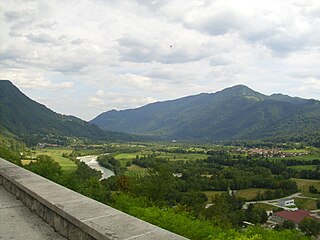
The Municipality of Kobarid is a municipality in the Upper Soča Valley in western Slovenia, near the Italian border. The seat of the municipality is the town of Kobarid.
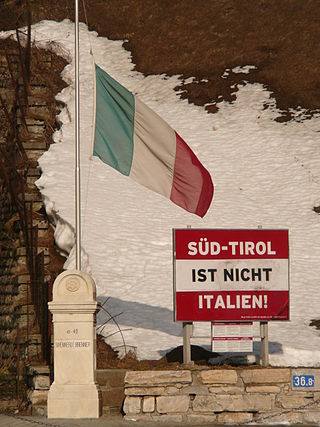
The South Tyrolean independence movement is a political movement in the Italian autonomous province of South Tyrol that calls for the secession of the region from Italy and its reunification with the State of Tyrol, Austria. Concurrently, some groups favor the establishment of an interim Free State of South Tyrol as a sovereign nation while reintegration is organized.
The Deutscher Verband was a coalition of bourgeois German-speaking political parties that was formed in South Tyrol in 1919 after the region was annexed by Italy. It was a merger of the Catholic Tiroler Volkspartei and the national liberal Deutschfreiheitliche Partei. The German-speaking Social Democrats, for their part, joined with the Italian Socialist Party.

















